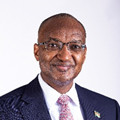Peer-Learning Webinar Series on Digital Technologies/Money in Asia and the Pacific
IMF – Singapore Regional Training Institute
In collaboration with the IMF Monetary and Capital Markets and Asia and Pacific Departments
In collaboration with the IMF Monetary and Capital Markets and Asia and Pacific Departments
May 11, 2023
The Asia and the Pacific region is at the forefront of experimentation and the adoption of digital technologies. In the area of finance, they range from private payment systems to central bank digital currencies, and to technologies to foster financial inclusion. Efforts are also under way to use digital technology to analyze publicly available data in real time as an additional input into macroeconomic policy making.
This peer-learning series will share information about emerging good practices drawing on in-depth analysis of individual country cases, and highlight emerging IMF capacity development in this fast-growing area. The series focuses on (i) private payment systems; (ii) central bank digital currency (CBDC); (iii) fintech and financial inclusion; (iv) digital money cross-border flows; (v) capital flow management in a digital age, and (vi) digital banking. The next event is Capital Flow Management in a Digital Age.
Events:
|
Past Events |
|
| November 14, 2023 | Central Bank Digital Currency: Emerging Good Practices |
| May 11, 2023 | Digital Banking in Asia |
| March 29/30, 2023 | Capital Flow Management in a Digital Age |
| November 8, 2022 | Cross-Border Digital Payment Systems The Case of Singapore, Thailand, Malaysia, and Beyond |
| September 28, 2022 | Fintech and Financial Inclusion: Asia-Africa and the Case of Bangladesh |
| July 6/7, 2022 | Central Bank Digital Currency and the Case of China |
| June 2, 2022 | At the Frontier: India's Digital Payment System and Beyond |
Central Bank Digital Currency: Emerging Good Practices
Many countries in the world are keenly interested in Central Bank Digital Currency (CDBC) developments, some have been researching and even launched pilots, and a few have already started to issue CDBCs. Based on the experiences so far, the IMF will be launching a virtual CBDC Handbook that provides information about emerging good practices that might be useful for policymakers, academics, and the informed public alike. As part of STI’s 25th anniversary celebration, this event will provide an overview of key insights and discuss next steps. The event is hybrid and open to the public and media.
Please note advance registration is required to attend this event. You will need to register for the conference by using this link: https://web.cvent.com/survey/691b9940-daa8-4670-8e2b-c0353b87bba3/welcome
|
November 14, 2023 10:15 a.m. – 12:15 p.m. (Singapore) 11:15 a.m. – 1:15 p.m. (Tokyo) 9:15 a.m. – 11:15a.m.(Phnom Penh) November 13, 2023 9:15 p.m. – 11:15 p.m. (Washington)
Location: IMF-Singapore Regional Training Institute, 79 Robinson Rd CapitaSky Level 16-01, Singapore 068897 |
|
| Welcome remarks | Mr.Dominique Desruelle,Director, Institute for Capacity Development, IMF |
| Keynote remarks |
Ms. Kristalina Georgieva, Managing Director, IMF Mr. Ravi Menon,Managing Director, Monetary Authority of Singapore Mr. Kentaro Ogata,Deputy Director-General of the International Bureau, Ministry of Finance, Japan —virtual Ms. Serey Chea, Governor, National Bank of Cambodia —virtual |
| Moderator | Ms. Shirin Hamid, Director and Chief Information Officer, IMF |
| Speakers |
Mr. Dong He, Deputy Director, Monetary and Capital Markets Department, IMF Presentation:Central Bank Digital Currency: Initial Considerations Ms. Yan Liu, Deputy General Counsel, Legal Department, IMF Presentation:CBDC Policy: The Legal and Financial Integrity Element Mr. Changchun MU,Director General, Digital Currency Institute, the People’s Bank of China—virtual Mr. Shri Suvendu Pati, Chief General Manager, Fintech Department, Reserve Bank of India Mr. Ryan Rizaldy, Director of Payments, Bank Indonesia |
| Questions & Answers | |
| Closing remarks |
Alfred Schipke, IMF-STI Director |
Digital Banking in Asia
May 11, 2023: 7:00—9:00 p.m. (Singapore) | May 11, 2023: 1:00—3:00 p.m. (Basel, Switzerland) | May 11, 2023: 7:00—9:00 a.m. (Washington, D.C)
Banks without a physical presence of branches—so-called digital banks or neobanks—have been growing in the Asia Pacific region. They tend to distinguish themselves from traditional banks using technology such as cloud computing, big data, artificial intelligence, application programming interfaces, and making banking services available on any device at any time.
Reflecting their cost advantages, many of them have focused on small investors and SMEs. Since hundreds of millions are still underbanked in the Asia Pacific region, they can be part of the solution to foster financial inclusion. The rapid growth of digital/neo-banks can be a source of value, but it could also translate into risks, including concentration and operational risks. This peer-learning event will focus on digital banking and discuss Asian countries’ experience. This will be a virtual event and be open to the public and the media.
| Welcome |
|
| Opening Remarks |
Moderator
Digital Banking: Opportunities and Challenges
Overview of Digital Bank Regulation in Singapore
Contacts: Webinar Support: Joan Goh, Senior Programs Executive, STI: jgoh@imf.org IT Support: Reagan Lie, Information Management and Communication Officer, STI: rlie@imf.org Media Contact: Pemba Tshering Sherpa, Press Officer, Communications Department, IMF: PSherpa@imf.org |
Capital Flow Management in a Digital Age
March 30, 2023: 10:00—11:30 a.m. (Singapore) / March 29, 2023: 10:00—11:30 p.m. (Washington, D.C.)
In an interconnected world, capital flows can bring important benefits for countries but also imply challenges such as large and volatile flows that can pose macroeconomic and financial stability risks. To mitigate such risks. emerging markets and developing countries with less developed financial markets often have some form of restrictions on capital flows, including in Asia and the Pacific. As a matter of fact, capital flow management measures (CFMs) can be part of a broader policy toolkit to help countries reap the benefits of capital flows, while managing the associated risks.
In this context, crypto assets can potentially pose a challenge for the implementation of CFMs. Among others they can undermine the ability to verify the nature of transactions and the identifies of transacting parties. Furthermore, the lack of a common and consistent taxonomy of crypto assets currently leads to inconsistencies in regulation and gaps in regulatory coverage. Since many crypto service providers operate across-countries the enforcement by national authorities more diffident. Importantly, most crypt assets are traded pseudonymously and held without identification of the residence of the asset holder.
At the same time, the public sector can take advantage of the underlying technologies of crypto assets to enhance public policy objectives. In principle, technological advances make it possible to embed some CFMs in the design of central bank digital currency (CBDC) through features of programmable money. Some CFMs can be potentially coded as an algorithm in the design of CBDC, for example, using “smart contracts”. This points to the possibility of maintaining effectiveness of CFM implementation while improving efficiency of cross-border payments.
Starting with an overview of CFMs, the event will focus on how crypto assets could impact the effectiveness from a structural and longer-term perspective and propose policy options, and how CBDC design should take into CFM into consideration.
This will be a virtual event and will be open to the public and the media.
| Welcome |
|
| Opening Remarks |
|
| Moderator |
|
| Presenters |
Setting the Stage: An Overview of Capital Flow Management Issues
Capital Flow Management in the Digital Age: Challenges from Crypto Assets
CBDC Design and Capital Flow Management—the mBridge Experiment |
| Q&A | |
| Closing Remarks |
|
Contacts:
Webinar Support: Alina Tan, Senior Programs Executive, STI: atan@imf.org
IT Support: Reagan Lie, Information Management and Communication Officer, STI: rlie@imf.org
Media Contact: Ting Yan, & Asia Communications Lead, Communications Department, IMF: tyan@imf.org
Cross-Border Digital Payment Systems: The Case of Singapore, Thailand, Malaysia, and Beyond
Tuesday, November 8, 2022, 1:30 p.m. – 3:30 p.m. (Singapore Time) / Tuesday, November 8, 2022, 6:30 a.m. – 8:30 a.m. (Basel Time)
Digitalization of cross-border payments brings large benefits lowering transaction costs, increasing transaction speed, and improving access and transparency. The benefits are not only tangible for large companies but also for individuals, including those at the lower end of the income spectrum. For example, the 1 billion migrant workers who in the past faced fees of 15 percent or more for money transfers to their home countries--and are still paying 7 percent on average today—would see their purchasing power increase significantly. A number of countries in Asia have first-hand experience in setting up bilateral digital cross-border payment systems. But even among countries with similar infrastructures and frameworks, technical discussions about rules and regulation can last several years. Scaling up such arrangements might be the challenging given capacity constraints and differences in existing infrastructure and financial sector development among countries calling for multilateral solutions, such as Project Nexus.
This event provides an overview of the evolving digital cross-border payment landscape, discusses country experiences, and provides insights into the way forward. The event will bring together government officials from Singapore, Thailand and Malaysia, the private sector, as well as IMF and BIS staff.
| Welcome |
|
| Opening Remarks |
Bo Li, Deputy Managing Director, IMF |
| Moderator |
|
| Presenters |
A Primer on Digital Cross-Border Payment Systems
Singapore’s Experiences with Digital Cross-Border Payment Systems and the Way Forward
Initial Considerations for a Multi-Country Platform |
| Panelists |
Thailand’s Experience with Digital Cross-Border Payment Systems
Experience with Cross-Border Digital Payment Systems
Q&A |
| Closing Remarks |
|
Contacts:
Webinar Support: Jolina Wong, Senior Programs Executive, STI: jwong@imf.org
IT Support: Willip Ho, Information Management and Communication Officer, STI: who3@imf.org
Media Contact: Pemba Sherpa, Communications Officer for Fintech and Asia Pacific Department, IMF: psherpa@imf.org
Fintech and Financial Inclusion: Asia-Africa and the Case of Bangladesh
September 28, 2022 5:00 – 7:00 p.m. (Dhaka time) ; September 28, 2022 2:00 – 4:00 p.m. (Nairobi Time); September 28, 2022 8:00 – 10:00 p.m. (Soeul Time); September 28, 2022 7:00 – 9:00 p.m. (Singapore time); September 28, 2022 7:00 – 9:00 a.m. (Washington, D.C. Time)
Historically, Bangladesh’s financial inclusion strategy has centered on microcredit. Efforts have since shifted to financial inclusion that focuses on access to bank accounts and credit for underserved groups with the objective of poverty reduction and promoting economic growth. Under its current financial inclusion strategy (2021-26), Bangladesh aspires to implement a concrete action plan which includes a set of twelve goals consisting of sixty-nine targets that have been crafted to foster future developments in financial inclusion. In these efforts, leveraging Fintech to build a digital ecosystem to make financial services more accessible for the population is being envisaged. In addition to the Governor of the Bangladesh Bank and other government officials and private sector representatives, the event will benefit from the experiences with digital money from the Governor of the Bank of Korea and the Governor of the Central Bank of Kenya, as well as IMF management and staff. The event is open to the public and to the media.
| Welcome Remarks |
|
| Opening Remarks |
Opening Remarks - Peer‐Learning Series: Fintech and Financial Inclusion and the Case of Bangladesh |
| Keynote Address |
|
| Presenters |
Fintech and Financial Inclusion: An Overview | English | Portuguese
Fintech and Financial Inclusion and the Case of Bangladesh | English | Portuguese |
| Panelists |
Kenya’s Experience in Leveraging on Fintech to Propel Financial Inclusion
|
| Q&A | |
| Closing Remarks |
|
Contact:
Webinar Support: Su Hsing Wong, Programs Executive, STI: swong@imf.org
IT Support: Reagan Lie, Information Management and Communication Officer, STI: rlie@imf.org
Media Contact: Ting Yan, Press Officer & Asia Communications Lead, Communications Department, IMF: tyan@imf.org
Central Bank Digital Currency and the Case of China
July 7, 2022 10:00 a.m. – 12:00 p.m. (Singapore/Beijing); July 6, 2022 10:00 p.m. – 12:00 a.m. (Washington, D.C.)
Central Bank Digital Currency (CBDC) has become an important topic globally, generating broad interest among policy makers, investors, and the public alike. A number of countries in Asia and the Pacific in turn are at the forefront of experimentation. China, for example, has been doing research on CBDC since 2014 and since then launched several pilots; China’s e-CNY testing now involves commercial banks and internet companies. This event will hence provide an overview of CBDC developments and focus on experiences and lessons from China. The event will bring together the IMF and People’s Bank of China and Hong Kong Monetary Authority staff, as well as academics and international experts. This is a closed-door event.
| Agenda and Speaker Bios |
|
| Welcome |
|
| Opening Remarks |
|
| Moderator |
|
| Presenters |
|
| Panelists |
|
| Q&A | |
Contact:
Webinar Support: Ms. Elizabeth Teo, Senior Programs Executive, STI : eteo@imf.org
IT Support: Mr. Willip Ho, Information Management and Communication Officer, STI: who3@imf.org
Media Contact: Ms. Ting Yan, Press Officer & Asia Communications Lead; Communications Department, IMF: tyan@imf.org
At the Frontier: India's Digital Payment System and Beyond
June 2, 2022 4:30 p.m. – 6:30 p.m. (India Time); June 2, 2022 7:00 p.m. – 9:00 p.m. (Singapore Time); June 2, 2022 7:00 a.m. – 9:00 a.m. (Washington, D.C. Time)
Already before the pandemic, in several countries, including in Asia, the expansion of digital payments had become an important driver for financial innovation and inclusion. The COVID-19 pandemic has accelerated this process. In India, the rapid expansion of digital payments has been facilitated by a strong digital infrastructure (including Aadhar and UPI) and a supportive policy environment for advancing digital financial services. At the same time, the authorities are taking advantage of fintech innovations to further improve financial sector infrastructure, digital money cross-border flows, as well as to expand access to mobile financial services.
This event, which will kick off a regional series, will provide an overview
of latest developments in digital payments, with focus on lessons from
India, as well as look to a future with a significant role for Central Bank
Digital Currencies (CBDCs) in digital payment systems. The event will bring
together IMF and Reserve Bank of India officials as well as Indian and
international experts.
| Welcome Remarks |
|
| Opening Remarks |
|
| Moderator |
|
| Keynote Address |
The RBI’s Strategy for the Financial Sector |
| Presenters |
Digitalization of Money and Payments: An Overview
|
| Discussants |
|
| Q&A | |
| Closing Remarks |
|
Contact:
Webinar Support: Alina Tan, Senior Programs Executive, STI: atan@imf.org
IT Support: Reagan Lie, Information Management and Communication Officer, STI: rlie@imf.org
Media Contact: Ting Yan, Press Officer & Asia Communications Lead, Communications Department, IMF: tyan@imf.org
















































